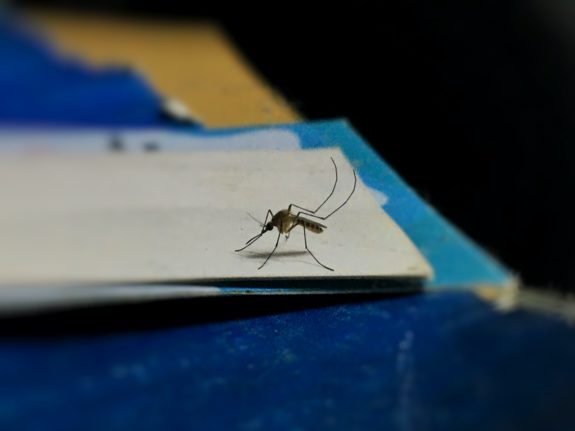Two or four? Or three? Starting from the left or the right? Or are we supposed to shake hands? For foreigners living in France, it can be easy to forget all the questions you used to have to ask yourself when meeting up with friends or being introduced to somebody new.
In the spring of 2020, the Covid-19 pandemic changed everything – suddenly the French government was advising its citizens not to kiss people on the cheek. In a world where gestes barrières (protective measures – literally ‘barrier gestures’) were essential to saving lives, there was no place for ‘la bise‘.
READ ALSO Who to kiss in France, how many times and on which cheek
But you may have noticed lately, in the street or in restaurants, groups of friends going in for the kiss. Or maybe your in-laws are no longer taking no for an answer.
Today, 65 percent of people in France kiss their close friends, family or colleagues on the cheek, according to the results of a survey from Ifop, published on October 15th. That’s a significant increase on March 2021, when 39 percent continued doing la bise, although it’s too early to talk about a return to normal – before the first lockdown, but after the virus had begun circulating in France, 91 percent of people participated in the greeting, according to survey results from March 5th, 2020.
A quarter of French people are even more relaxed. 23 percent said they would now kiss a stranger, more than double the rate six months ago (9 percent).

‘Small intimacy’
For some foreigners in France, la bise can’t come back soon enough.
Katherine Watt, a writer from San Francisco who has lived in Paris for four years, said she was happy to see the custom return. “It can be a clue to the depth of a friendship or relationship,” she told The Local.
“And I enjoy the small intimacy. When I first came here I missed hugging which of course is not a French thing. As life gets more and more ‘normal’ here again it’s nice to return to that.”
John Salusbury Jones said: “I think it’s great. Spent two months in the Ardeche recently, 99 percent of our French friends kissed with us.”
I think it's great. Spent two months in the Ardeche recently, 99% of our French friends kissed with us. 🏴🇫🇷
— John Salusbury Jones (@JohnSalusbury) October 18, 2021
“I’ve started again and I’m glad to see it’s back,” Laura Tassi wrote on Facebook.
“I think it’s important to keep up the tradition,” said Zoe Walsh, 24, from Ireland. Zoe said she would have been hesitant had someone leaned in for the kiss this time last year, but now the health situation has improved she’s less worried.
“I would not mind at all even if they were only an acquaintance.”
Too soon?
Although more than 85 percent of people over the age of 12 are now fully vaccinated, health authorities are cautious about the effects of cold weather and the potential for vaccines to become less effective over time. The official line is unchanged: we should still be keeping our distance.
On October 14th, Jean-François Delfraissy, head of France’s Scientific Council, told Le Monde, “We need to insist on the importance of maintaining protective measures as much as possible, at least until spring 2022.”
READ ALSO Bye bye ‘la bise’: Has Covid put an end to the French greeting kiss?
In this context, many of those embracing la bise have become more selective with whom they’re getting close to. According to Ifop’s survey, only 12 percent of people “systematically” kiss close friends and family. That figure is highest among the 25 to 34 age group (19 percent), while those on the older side remain more cautious (5 percent of over-65s).
“No more kissing everyone at a party,” said Charli Russell, 30, who is from Guernsey but now lives in Brittany. “I do a wave and a bonjour in everyone’s general direction and bise with my close friends.”
One Twitter user said: “People often wait when you meet them & if you don’t approach them or them you (to kiss on cheeks), we ‘check’ fists.”
My experience : Some people do now kiss cheeks (close friends/family) in France. But people often wait when you meet them & if you don’t approach them or them you (to kiss on cheeks), we ‘check’ fists.
— J’aime in France (@frgbju) October 18, 2021
Finally an excuse
While the custom is gradually returning to French life, there are those who can’t imagine going back to sharing their germs.
“An air kiss is I think the closest I will get again unless a very close friend – I don’t want other people’s colds, viruses,” American Kaylee Karen Linscott, 70, told The Local.
She was always careful, especially during flu season, due to an autoimmune disease, and is now hoping to avoid la bise as much as possible. “I have to say we felt a bit pressured when we lived in Brittany, but here in the Dordogne we have not felt that pressure. I think many people might feel differently after Covid.”
READ ALSO La bise: Who to kiss in France, how many times and on which cheek
For those who were never fully on board with the whole kissing thing, the pandemic has finally made avoiding it socially acceptable. Anna Perry said: “I hate it! After decades of la bise it took Covid for me to finally draw the line!”
Communications officer Sabrina Gaber added: “Culturally, I’ve never really taken to it… I was thinking something like, ‘I don’t want to kill my father-in-law with whatever school germs I’m harbouring – Covid or other’.”
American Abigail Goldman, 26, who lives in Nanterre, says she used to hate the greeting.
“I didn’t mind when the person just gave an air kiss next to the cheek,” she said. “However, there were too many occasions where I felt uncomfortable because the person (usually an old man!) physically kissed me on both cheeks. I found that extremely invasive.
“Although our family continues with la bise, I’ve found that the practice has generally lessened amongst acquaintances since Covid,” she added. “Even when Covid becomes less of a threat, I hope that the frequency of la bise will continue to decline.”
Handshakes less popular
Of course, people in France weren’t just going around kissing everybody they met before the pandemic – other common greetings have been affected, too.
The handshake, which is more common in a professional environment, has also been collateral damage. Before the first lockdown, 85 percent of people regularly shook hands with people they knew. That had fallen to 22 percent in March, but has since risen to 59 percent.




 Please whitelist us to continue reading.
Please whitelist us to continue reading.
La Bise was always a mistake and even more now that we have a chronic Covid virus.
What a shame that after getting out of the unhealthy habit people are returning to this dangerous behavior.
I don’t understand the problem. Neither COVID nor any other virus is transmitted by kissing a person’s cheek. It is passed when a person inhales an infected person’s exhalation. So, unless you’re kissing someone and then immediately talking into their face it is not a problem. A handshake is a far more efficient way of transferring viruses from one person to the next. The next time you faire la bise just hold your breath until it’s finished.